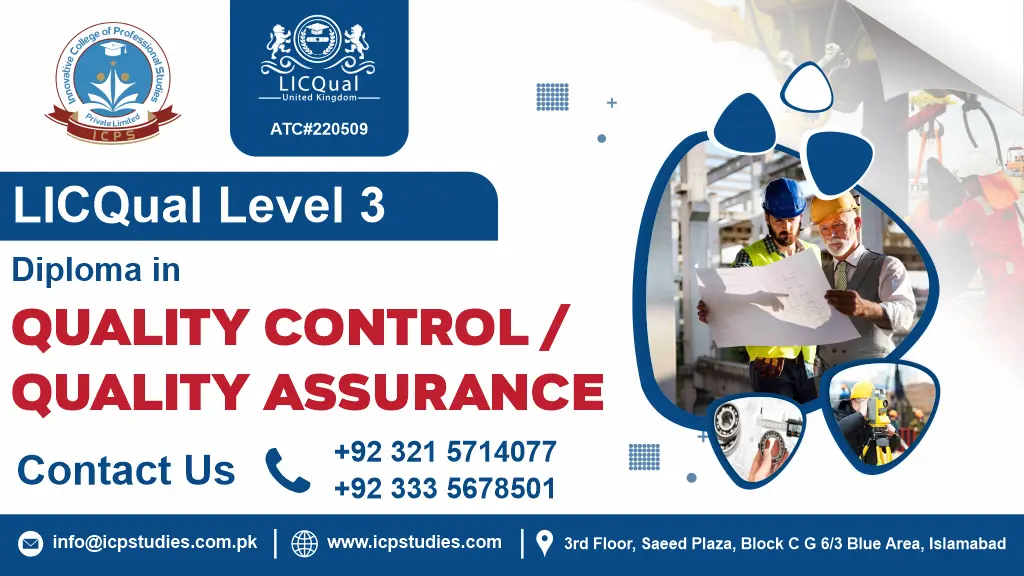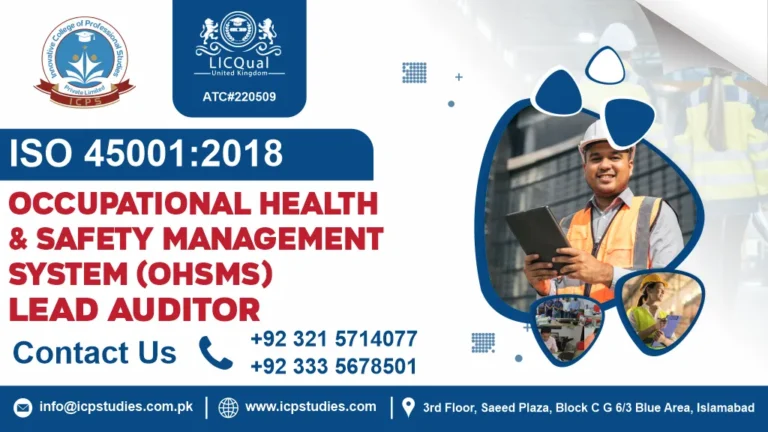The key to unlocking a green future for you and the planet
This comprehensive program is designed to provide aspiring professionals in the field with a solid foundation in the principles and practices of quality management. As industries evolve and the global market demands higher standards, individuals equipped with the knowledge and skills to ensure product and service quality become invaluable assets to organizations.
The LICQual Level 3 Diploma in Quality Control/Quality Assurance is a specialized qualification that caters to the diverse needs of individuals seeking to excel in quality management roles. Throughout this diploma program, participants will engage in a rigorous curriculum that covers essential aspects of quality control and assurance, equipping them with the competencies required to navigate the dynamic landscape of modern industries.
Whether you are a seasoned professional looking to enhance your skills or an entry-level candidate aspiring to embark on a career in quality management, this diploma offers a balanced blend of theoretical insights and practical applications. Join us on a journey where theory meets real-world scenarios, and participants develop the expertise needed to contribute significantly to organizational success through effective quality control and assurance practices.
Our dedicated team of experienced instructors is committed to providing a supportive and enriching learning environment. The LICQual Level 3 Diploma in Quality Control/Quality Assurance is not just a qualification; it’s a stepping stone towards professional excellence. Embrace the opportunity to elevate your career prospects and make a lasting impact in the realm of quality management.
Don’t wait – enroll today and take the first step towards a brighter future in environmental management. Contact us today to learn more about our Level 6 Diploma in Environmental Management and how it can help you achieve your professional goals.
All About Level 3 Diploma in Quality Control/ Quality Assurance
Course Overview
Program Overview:
The LICQual Level 3 Diploma in Quality Control / Quality Assurance offers a holistic curriculum designed to empower individuals with the expertise needed to thrive in quality management roles. Tailored for professionals seeking career advancement or entry into the field, this diploma provides a solid foundation in quality principles and practices.
Duration:
The program spans 6 to 12 months, offering flexibility for participants to manage their professional and personal commitments effectively while pursuing their education.
Intended Audience:
Ideal for professionals across diverse industries where quality control and assurance are paramount, including manufacturing, healthcare, and information technology. It’s also suitable for individuals looking to transition into quality management positions.
Key Learning Objectives:
- Foundations of Quality Management:
- Grasp fundamental quality management principles and their historical context.
- Quality Standards and Regulations:
- Understand international quality standards like ISO 9001 and industry-specific regulations.
- Quality Control Techniques:
- Master various tools and statistical methods for effective quality control and process enhancement.
- Quality Assurance Processes:
- Develop a comprehensive understanding of quality assurance methodologies.
- Learn to devise and implement quality assurance plans.
- Auditing and Inspection:
- Acquire auditing skills to conduct quality audits and inspections.
- Emphasize the importance of meticulous documentation and reporting in the auditing process.
- Continuous Improvement:
- Explore continuous improvement methodologies such as Six Sigma and Lean.
- Implement strategies to optimize organizational processes and performance.
This diploma is your gateway to a successful career in quality management, offering a blend of theoretical knowledge and practical skills essential for navigating the dynamic landscape of quality assurance and control.
Learning Outcomes
Knowledge-Based Learning Outcomes:
- Understanding Quality Concepts:
- Define and explain key quality control and quality assurance concepts.
- Demonstrate a comprehensive understanding of the principles of quality management.
- Regulatory Compliance:
- Identify and interpret relevant quality standards and regulations.
- Demonstrate knowledge of compliance requirements in the industry.
- Risk Management:
- Explain the principles of risk management in quality control and assurance.
- Assess and analyze potential risks to product or service quality.
- Documentation and Reporting:
- Create and maintain quality documentation, including procedures and reports.
- Develop skills in effective communication of quality-related information.
Skills-Based Learning Outcomes:
- Quality Inspection Techniques:
- Apply various inspection techniques to assess product or service quality.
- Demonstrate proficiency in the use of inspection tools and equipment.
- Root Cause Analysis:
- Utilize root cause analysis methods to identify and address quality issues.
- Develop problem-solving skills in the context of quality assurance.
- Quality Auditing:
- Plan, conduct, and report on quality audits.
- Demonstrate understanding of auditing principles and techniques.
- Process Improvement:
- Identify opportunities for process improvement in quality control and assurance.
- Implement and monitor changes to improve overall quality.
Competency-Based Learning Outcomes:
- Quality Leadership:
- Exhibit leadership qualities in promoting a culture of quality within an organization.
- Facilitate the integration of quality practices into daily operations.
- Team Collaboration:
- Collaborate effectively with cross-functional teams to achieve quality objectives.
- Demonstrate the ability to lead and participate in quality improvement projects.
- Continuous Improvement:
- Engage in ongoing professional development to stay current with quality management trends.
- Implement and promote a culture of continuous improvement in quality processes.
- Ethical and Professional Behavior:
- Adhere to ethical standards in quality management.
- Demonstrate professional behavior and integrity in all quality-related activities.
Admission Criteria
Admission Criteria for LICQual Level 3 Diploma in Quality Control/Quality Assurance:
- Educational Qualifications:
- Applicants must possess a minimum of a high school diploma or equivalent qualification.
- A background in science, engineering, or a related field is preferred.
- Work Experience:
- Candidates with relevant work experience in quality control or quality assurance will be given preference.
- A minimum of one year of work experience in a related field is desirable.
- Language Proficiency:
- Proficiency in the English language is essential, as the program involves reading technical documents, writing reports, and effective communication.
- Applicants may be required to provide proof of English language proficiency through standardized tests.
- References:
- Submission of at least two professional or academic references attesting to the applicant’s ability to succeed in a quality control/quality assurance program.
- Interview:
- Shortlisted candidates may be required to participate in an interview to assess their motivation, communication skills, and suitability for the program.
- Statement of Purpose:
- Submission of a well-articulated statement of purpose outlining the applicant’s motivation for pursuing the LICQual Level 3 Diploma in Quality Control/Quality Assurance.
- Technical Aptitude:
- While no specific technical qualifications are mandatory, a basic understanding of scientific and technical principles will be beneficial for successful completion of the program.
- Age Limit:
- There is no strict age limit for admission, but candidates should be in good health and able to meet the physical demands of practical exercises and fieldwork if required.
- Computer Literacy:
- Basic computer skills are necessary, as the program may involve the use of software tools for data analysis and documentation.
- Commitment to Continuous Learning:
- Applicants should demonstrate a commitment to continuous learning and professional development in the field of quality control and quality assurance.
- Diversity and Inclusion:
- The program encourages applications from individuals of diverse backgrounds and experiences.
- Adherence to Ethical Standards:
- Applicants must adhere to ethical standards and principles, as the field of quality control/quality assurance requires a commitment to integrity and responsibility.
Ideal Candidate
Key Qualifications and Skills:
- LICQual Level 3 Diploma in Quality Control/Quality Assurance:
- Completion of the LICQual Level 3 Diploma in Quality Control/Quality Assurance is a prerequisite. This qualification ensures that the candidate has acquired a comprehensive understanding of quality management principles, statistical process control, and quality assurance methodologies.
- Attention to Detail:
- The ability to meticulously review and analyze data, products, and processes to identify discrepancies and ensure compliance with quality standards.
- Analytical Skills:
- Proficiency in utilizing analytical tools and methodologies to assess data and trends, identify root causes of issues, and propose effective corrective and preventive actions.
- Communication Skills:
- Strong verbal and written communication skills are essential for documenting quality procedures, reporting findings, and collaborating with cross-functional teams to implement improvements.
- Problem-Solving Ability:
- A proactive approach to problem-solving, with the ability to address challenges in a systematic and effective manner. The candidate should be capable of proposing innovative solutions to enhance overall product and process quality.
- Team Player:
- The ability to collaborate effectively with colleagues across various departments, fostering a culture of quality consciousness and continuous improvement.
- Regulatory Compliance:
- Knowledge of industry-specific regulations and standards to ensure that quality processes and products align with the required legal and regulatory frameworks.
- Computer Proficiency:
- Comfortable using quality management software and tools to document, track, and analyze quality-related data.
- Experience:
- While not mandatory, any prior experience in a quality control or quality assurance role is a plus. Practical application of knowledge gained through the LICQual Level 3 Diploma is highly valued.
- Continuous Learning:
- A commitment to staying updated on industry best practices, emerging trends, and advancements in quality control/quality assurance.
The ideal candidate will play a crucial role in upholding and enhancing our commitment to delivering high-quality products/services, ensuring customer satisfaction, and contributing to the overall success of our organization.
Key Takeaways
Mandatory Units
1. Introduction to Quality Control/Quality Assurance:
- Understand the principles and importance of quality in various industries.
- Overview of relevant quality control and assurance standards.
2. Quality Management Systems:
- Knowledge of different quality management systems.
- Implementation and maintenance of quality management systems.
3. Statistical Methods in Quality Control:
- Understanding statistical tools and methods for quality analysis.
- Application of statistical techniques in quality control processes.
4. Quality Auditing:
- Conducting internal and external quality audits.
- Reporting and documentation of audit findings.
5. Product and Process Improvement:
- Identifying areas for improvement in products and processes.
- Developing and implementing improvement plans.
6. Regulatory Compliance:
- Understanding and ensuring compliance with relevant quality regulations and standards.
- Documenting and maintaining compliance records.
7. Risk Management in Quality Control/Quality Assurance:
- Identifying and assessing risks in quality processes.
- Developing risk mitigation strategies.
8. Communication and Teamwork in Quality Management:
- Effective communication within a quality management framework.
- Working collaboratively in a quality assurance team.
9. Document Control and Record Keeping:
- Establishing and maintaining a document control system.
- Record keeping for quality assurance purposes.
10. Health and Safety in Quality Control: – Understanding and promoting health and safety practices in quality control environments. – Managing risks related to health and safety in quality processes.
FAQs Related to Level 3 Diploma in Quality Control/ Quality Assurance







